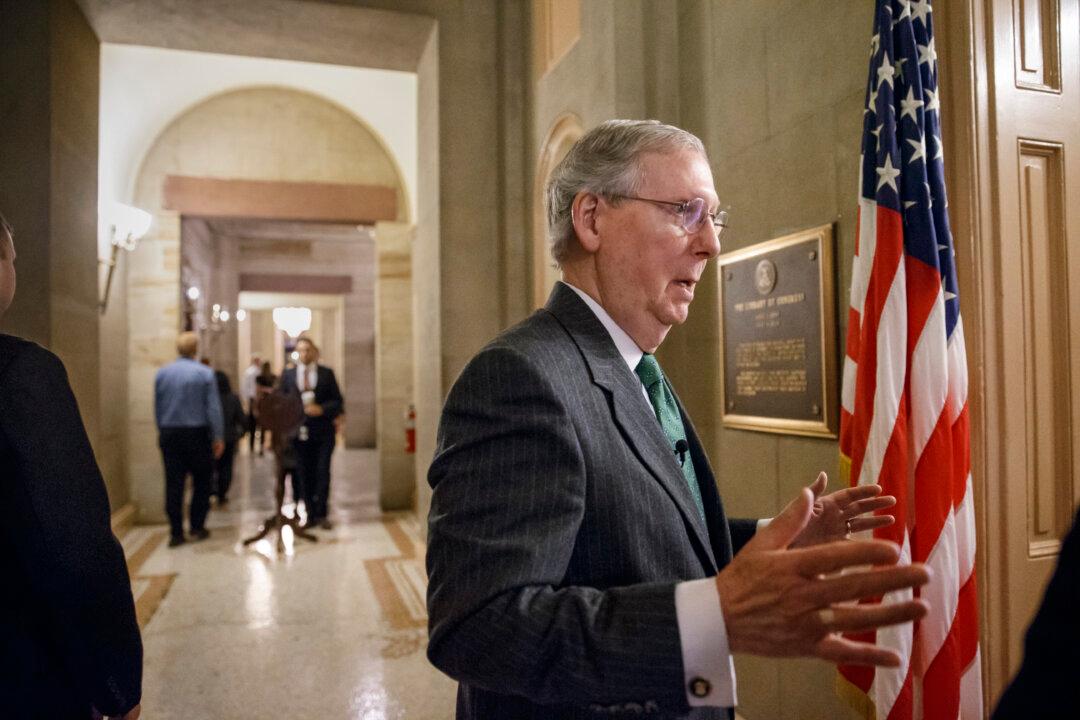WASHINGTON—Year-end holidays beckoning, House Republicans struggled Tuesday to coalesce behind a plan that avoids a government shutdown next week and simultaneously challenges President Barack Obama’s decision to spare millions of immigrants from deportation.
A separate bipartisan bill to extend dozens of expiring tax breaks was on a more certain track for approval, even though it would increase federal red ink by an estimated $44 billion over a decade. Republicans supported it, although they intend to mount a strong anti-deficit campaign next year, and the White House signaled that Obama would sign the one-year measure after threatening to veto a longer-term version.
Taxes, spending and immigration are the dominant issues in the final few weeks of a two-year Congress that has been a hothouse for partisan gridlock — and that seemed on track for one final showdown if not more.
After meeting privately with the House GOP rank and file, Speaker John Boehner of Ohio said Obama’s actions on immigration were a “serious breach of our Constitution.”
The administration countered. “The reality is that, for decades, presidents have used executive authority to enhance immigration policy,” Secretary Jeh C. Johnson of the Department of Homeland Security told a skeptical House committee. He said he was “fully comfortable” that the president had acted within his authority in directing federal agencies not to make a priority of deporting immigrants in the country illegally, as long as they were otherwise law-abiding.
Republicans were unsparing in their denunciations of the president’s actions, although some also said their chances of staying Obama’s hand would be stronger after the party takes control of the Senate in January. “I think they understand it’s going to be difficult” until then, Boehner said after his meeting with GOP legislators.
Some conservatives spoke against a leadership-backed plan to provide funding for nearly the entire government through September without gaining immigration-related concessions in return. “The cavalry is coming,” said Rep. Jim Jordan of Ohio, indicating the party shouldn’t give up significant leverage before it takes control of the Senate.
There were other priorities as one Congress neared an end and another waited in the wings.
House and Senate negotiators reported agreement on a sweeping defense bill. It ratifies Obama’s expansion of the U.S. military mission in Iraq and allows the Pentagon to train moderate Syrian forces, steps designed to counter Islamic State militants.
Separately, Senate Majority Leader Harry Reid worked to confirm dozens of Obama’s nominees before Democrats lose their majority. A pair of ambassadorial picks won confirmation during the day, with three judicial nominees and a spate of Energy Department appointees on track to follow later in the week.
A long-running dispute between the parties over Obama’s judicial appointments prompted Reid and the Democrats last year to weaken the minority party’s ability to block confirmations. As a result, it is unclear how inclined Republicans will be to approve presidential appointments next year.
Boehner told reporters no final decisions had been made for bringing legislation to a vote to keep financing the government beyond Dec. 11 or for attacking Obama’s immigration action.
Other officials said the tentative schedule called for the House to vote Thursday on legislation by Rep. Ted Yoho, R-Fla., stating that Obama lacks authority to take the steps he announced two weeks ago. The measure would likely pass on a party-line vote, and was described by some Republicans as merely a face-saving gesture for angry lawmakers, since it faces certain death in the Senate.
Funding legislation would follow next week, in the form of a measure assuring routine operations throughout nearly the entire government through the Sept. 30, 2015 end of the fiscal year.
The sole exception would be the Homeland Security Department, which carries out immigration laws. It would receive funding to last only until early next year, a short timetable that would permit a new Congress under two-house Republican control to mount a quick challenge to the White House over immigration.
House Democrats made it clear they didn’t like singling out Homeland Security. Rep. Nita Lowey of New York, the senior Democrat on the Appropriations Committee, said it “would hamper the Secret Service’s ability to address White House security deficiencies,” an apparent reference to a recent episode in which an intruder jumped the White House fence and made it into the executive mansion before being stopped.
The one-year tax bill would keep alive several breaks in wide use, as well as others more narrowly targeted.
Extending a tax credit for facilities that produce wind and other renewable energy resources was the largest single item, at more than $9 billion over a decade.
An extension of a credit designed to encourage research and development by businesses was included, at a 10-year cost of more than $7.6 billion. Race horse owners would continue to benefit from an existing break, as would the owners of NASCAR and other “motorsport entertainment complexes” put into operation before Dec. 31.
From The Associated Press. AP reporters Andy Taylor, Charles Babington, Stephen Ohlemacher and Donna Cassata contributed to this story.




